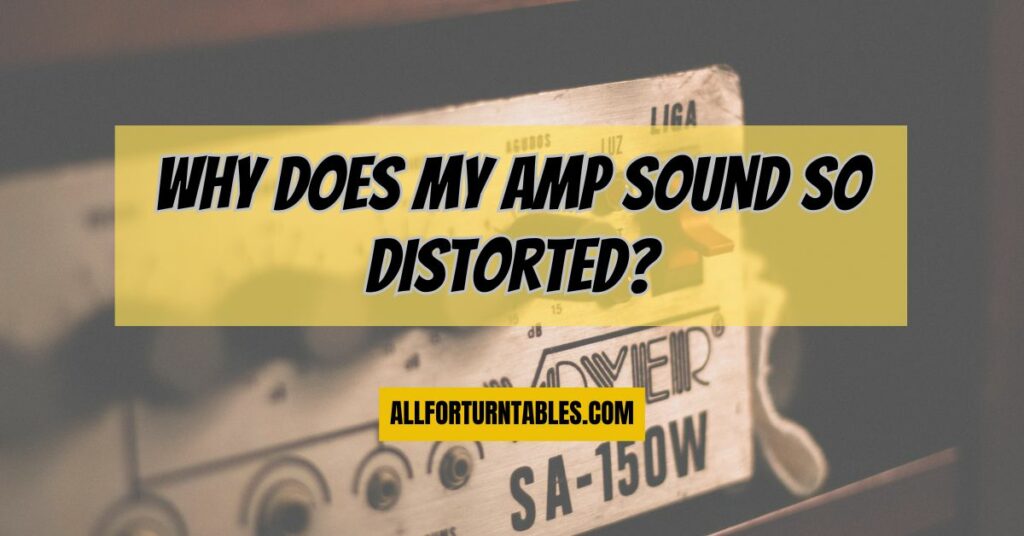For many guitarists, the joy of playing comes from the rich, crisp, and harmonious tones that flow from their amplifier. However, there are times when your amp might not be as cooperative as you’d like, and the sound becomes overly distorted. This can be frustrating, but fear not, for this comprehensive guide is here to demystify the reasons behind the distorted sound and provide practical solutions.
Understanding Amplifier Distortion
Before we dive into the causes and solutions, let’s get to grips with amplifier distortion. Distortion is not always a bad thing; in fact, it’s a sought-after effect in many music genres, including rock, metal, and blues. It’s a sound that adds grit, character, and edge to your playing. However, the problem arises when the distortion is uncontrollable or unintended.
There are two primary types of amplifier distortion:
- Overdrive: This is a mild form of distortion that occurs when the amplifier’s preamp tubes are pushed to their limits, giving your sound a warm and crunchy texture.
- Heavy Distortion: This is the more aggressive form of distortion that happens when the amplifier’s power amp tubes are overdriven, resulting in a saturated and heavily distorted tone.
Let’s explore the reasons behind your amp sounding excessively distorted and how to address them.
1. Improper Gain Settings
One of the most common reasons for unwanted distortion is incorrect gain settings. If your gain is cranked too high, it can result in a harsh and unruly sound.
Solution: Start by setting your amp’s gain control to a lower level and gradually increase it until you achieve the desired amount of distortion. Finding the right balance is key.
2. Faulty Cables
The quality of your cables matters more than you might think. Poor-quality or damaged cables can lead to signal degradation and unwanted noise.
Solution: Invest in high-quality, shielded cables to ensure a clean and clear signal. Regularly inspect and maintain your cables to prevent issues.
3. Aging Tubes
Vacuum tubes (or valves) are critical components in your amplifier, responsible for shaping your tone. Over time, they wear out and can lead to degraded sound quality.
Solution: If your amp sounds worse than it used to, consider replacing the tubes. Consult the amp’s manual or a professional technician to ensure you choose the right replacements. Fresh tubes can breathe new life into your amp’s tone.
4. Inadequate Guitar Setup
Your guitar’s setup can significantly impact the way it interacts with your amp. High string action, poor intonation, or old, worn-out strings can contribute to a bad sound.
Solution: Regularly maintain and set up your guitar to ensure comfortable action, accurate intonation, and fresh strings.
5. Poor Technique
Sometimes, the issue is not with your gear but your playing technique. Sloppy playing can lead to unintended noise and poor tone quality when using distortion.
Solution: Dedicate time to improving your playing technique and practice muting strings when necessary. Good technique can make a world of difference.
6. Room Acoustics
The acoustics of the room you’re playing in can also affect your amp’s sound. A room that’s too reflective can lead to unwanted reflections and resonances.
Solution: Experiment with room treatment, such as adding rugs, curtains, or acoustic panels, and adjust your amplifier’s placement to mitigate undesirable room acoustics.
7. Pedal Chain Order
If you’re using pedals in your setup, the order in which you place them in your signal chain can have a significant impact on your tone.
Solution: Experiment with different pedal chain orders to find the best setup for your sound. Typically, overdrive and distortion pedals work better after the amp’s preamp stage.
8. Amplifier Quality
Sometimes, the issue may be with the quality of your amplifier. Low-quality amps may not handle distortion effects well, resulting in poor sound quality.
Solution: Consider upgrading to a higher-quality amplifier that is better suited for achieving the sound you desire.
Conclusion
Your amplifier sounding overly distorted is a common issue, but it’s one that can be addressed effectively. By identifying and addressing the factors mentioned above, you can significantly improve your tone and get the best out of your gear. Remember, it’s not just about having the right equipment; it’s also about knowing how to use it effectively. With patience, practice, and the right adjustments, you can reclaim the harmonious tones you crave from your amplifier.


